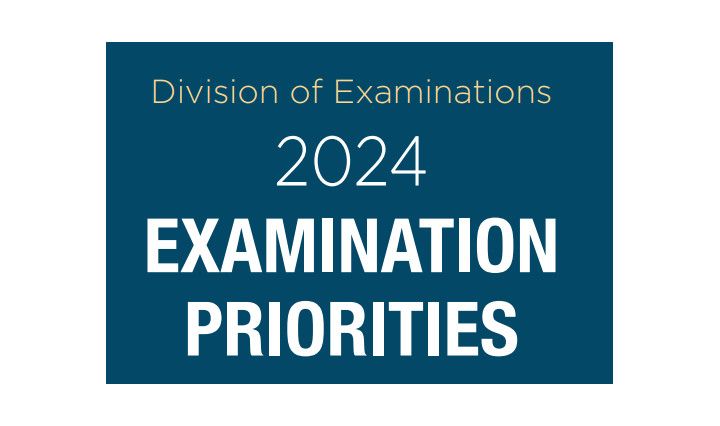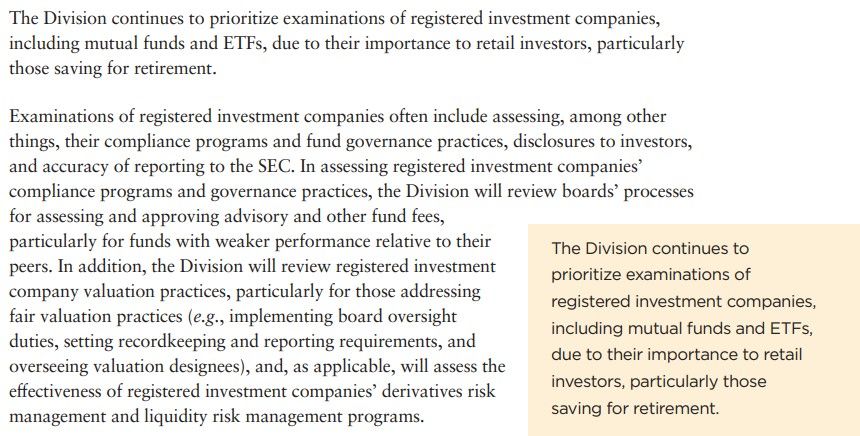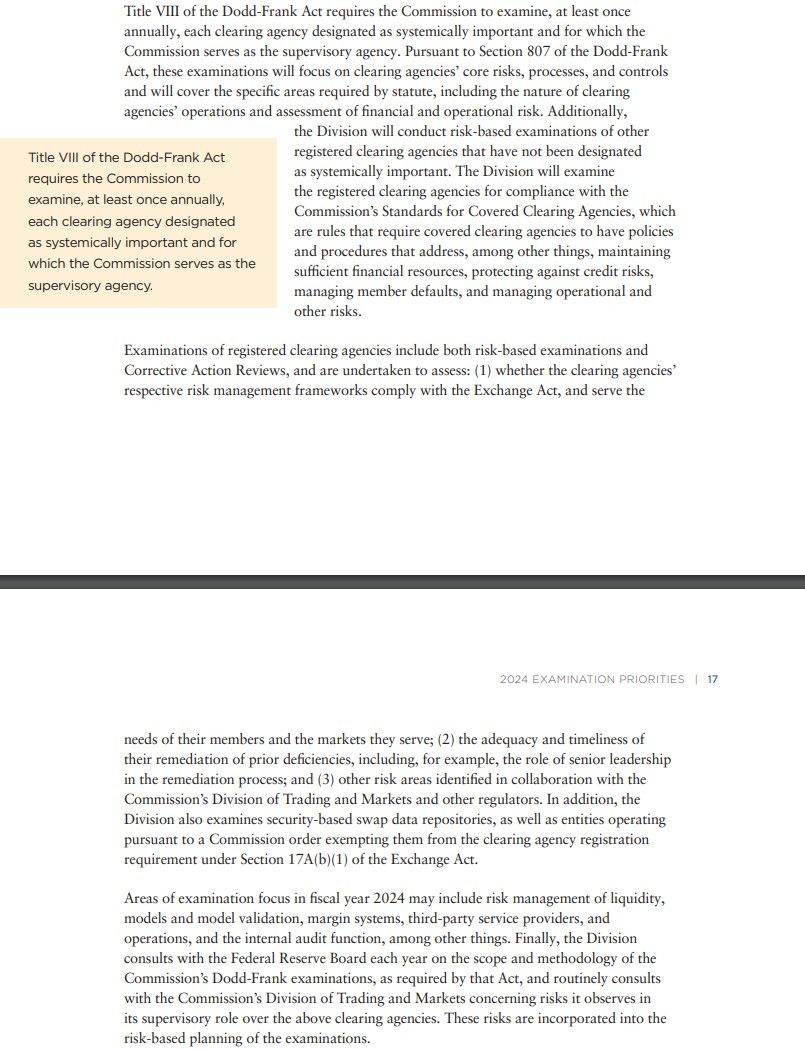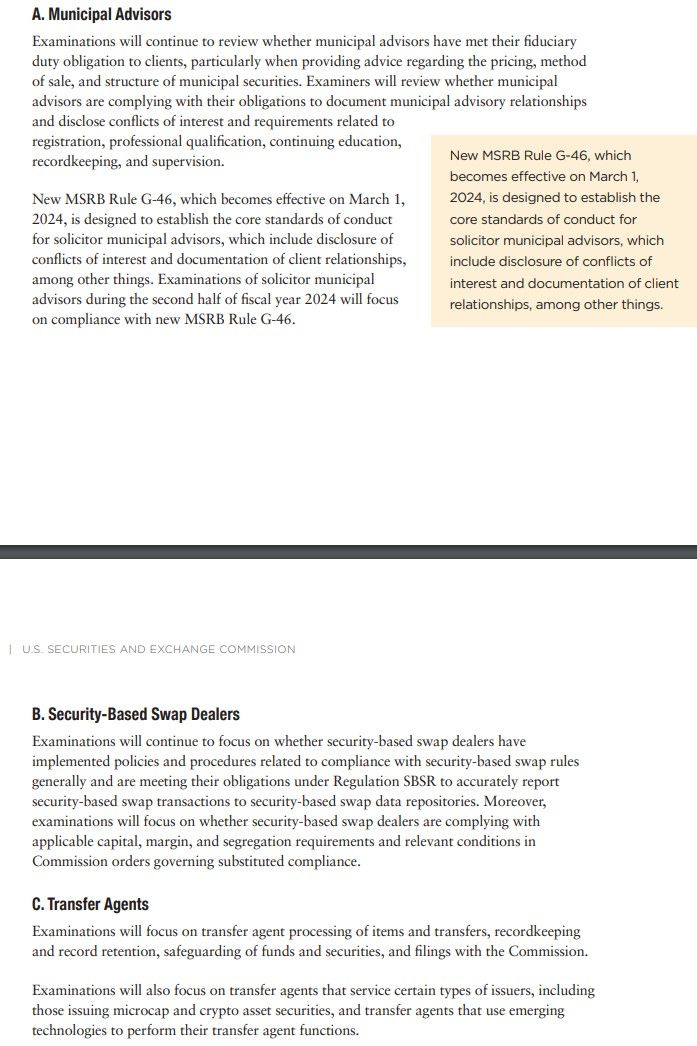SEC Alert! SEC Division of Examinations Announces 2024 Priorities. SEC to probe transparency of fees, compliance with derivatives rules, & liquidation procedures amid market volatility.


Examinations of Investment Advisers:
As a fiduciary, an investment adviser owes a duty of care and a duty of loyalty to its clients. An adviser must, at all times, serve the best interest of its clients and not subordinate its clients’ interest to its own.
In other words, an investment adviser cannot place its own interests ahead of the interests of its clients. In addition, an adviser is required to eliminate or make full and fair disclosure of all conflicts of interest which might incline the adviser—consciously or unconsciously—to render advice which is not disinterested such that a client can provide informed consent to the conflict. Examining for advisers’ adherence to their duty of care and duty of loyalty obligations remains a priority for the Division. In reviewing advisers’ adherence to this fiduciary standard, the Division continues to focus on:
- Investment advice provided to clients with regard to products, investment strategies, and account types, particularly those regarding:
- Complex products, such as derivatives and leveraged exchange-traded funds (ETFs);
- High cost and illiquid products, such as variable annuities and non-traded real estate investment trusts (REITs)
- Unconventional strategies, including those that purport to address rising interest rates.
Examination focus may be emphasized for investment advice provided to certain types of clients, such as older investors and those saving for retirement.
- Processes for determining that investment advice is provided in clients’ best interest, including those processes for:
- making initial and ongoing suitability determinations,
- seeking best execution
- Evaluating costs and risks
- Identifying and addressing conflicts of interest. Such assessments will also review the factors advisers consider in light of the clients’ investment profiles, including investment goals and account characteristics.
- Examinations will review how advisers address conflicts of interest, including:
- Mitigating or eliminating the conflicts of interest, when appropriate, and
- Allocating investments to accounts where investors have more than one account (e.g., allocating between accounts that are adviser fee-based, brokerage commission-based, and wrap fee, as well as between taxable and non-taxable accounts).
- Economic incentives that an adviser and its financial professionals may have to recommend products, services, or account types, such as the source and structure of compensation, revenue, or other benefits. Such economic incentives may exist when there is revenue sharing, markups, or other incentivizing revenue arrangements.
- Examinations will focus on the economic incentives and conflicts of interest associated with advisers that are dually registered as broker-dealers, use affiliated firms to perform client services, and have financial professionals servicing both brokerage customers and advisory clients to identify, among other things:
- Investment advice to purchase or hold onto certain types of investments (e.g., mutual fund share classes) or invest through certain types of accounts when lower cost options are available.
- investment advice regarding proprietary products and affiliated service providers that result in additional or higher fees to investors.
- Disclosures made to investors and whether they include all material facts relating to conflicts of interest associated with the investment advice sufficient to allow a client to provide informed consent to the conflict.
Particular examination focus will include:
- Marketing practice assessments for whether advisers, including advisers to private funds, have:
- Adopted and implemented reasonably designed written policies and procedures to prevent violations of the Advisers Act and the rules thereunder including reforms to the Marketing Rule.
- Appropriately disclosed their marketing related information on Form ADV.
- Maintained substantiation of their processes and other required books and records.
- Marketing practice reviews will also assess whether disseminated advertisements include any untrue statements of a material fact, are materially misleading, or are otherwise deceptive and, as applicable, comply with the requirements for performance (including hypothetical and predecessor performance), third-party ratings, and testimonials and endorsements.
- Compensation arrangement assessments focusing on:
- Fiduciary obligations of advisers to their clients, including registered investment companies, particularly with respect to the advisers’ receipt of compensation for services or other material payments made by clients and others.
- Alternative ways that advisers try to maximize revenue, such as revenue earned on clients’ bank deposit sweep programs.
- Fee breakpoint calculation processes, particularly when fee billing systems are not automated.
- Valuation assessments regarding advisers’ recommendations to clients to invest in illiquid or difficult to value assets, such as commercial real-estate or private placements.
- Safeguarding assessments for advisers’ controls to protect clients’ material non-public information, particularly when multiple advisers share office locations, have significant turnover of investment adviser representatives, or use expert networks
- Disclosure assessments to review the accuracy and completeness of regulatory filings, including Form CRS, with a particular focus on inadequate or misleading disclosures and registration eligibility.
Examinations of Investment Advisers to Private Funds:
- The portfolio management risks present when there is exposure to recent market volatility and higher interest rates. This may include private funds experiencing poor performance, significant withdrawals and valuation issues and private funds with more leverage and illiquid assets.
- Adherence to contractual requirements regarding limited partnership advisory committees or similar structures (e.g., advisory boards), including adhering to any contractual notification and consent processes.
- Accurate calculation and allocation of private fund fees and expenses (both fund-level and investment-level), including valuation of illiquid assets, calculation of post commitment period management fees, adequacy of disclosures, and potential offsetting of such fees and expenses.
- Due diligence practices for consistency with policies, procedures, and disclosures, particularly with respect to private equity and venture capital fund assessments of prospective portfolio companies.
- Conflicts, controls, and disclosures regarding private funds managed side-by-side with registered investment companies and use of affiliated service providers.
- Compliance with Advisers Act requirements regarding custody, including accurate Form ADV reporting, timely completion of private fund audits by a qualified auditor and the distribution of private fund audited financial statements.
- Policies and procedures for reporting on Form PF, including upon the occurrence of certain reporting events.
Investment Companies:

"The Division continues to prioritize examinations of registered investment companies, including mutual funds and ETFs, due to their importance to retail investors, particularly those saving for retirement."
- Fees and expenses and reviewing whether registered investment companies have adopted effective written compliance policies and procedures concerning the oversight of advisory fees and implemented any associated fee waivers and reimbursements.
- A particular focus will be on:
- Charging different advisory fees to different share classes of the same fund;
- Identical strategies offered by the same sponsor through different distribution channels but that charge differing fee structures.
- High advisory fees relative to peers.
- High registered investment company fees and expenses, particularly those of registered investment companies with weaker performance relative to their peers. Examinations will also review the boards’ approval of the advisory contract and registered investment company fees.
- Derivatives risk management assessments to review whether registered investment companies as well as business development companies have adopted and implemented written policies and procedures reasonably designed to prevent violations of the Commission’s fund derivatives rule (Investment Company Act Rule 18f-4). Review of compliance with the derivatives rule may include review of the adoption and implementation of a derivatives risk management program, board oversight, and whether disclosures concerning the registered investment companies’ or business development companies’ use of derivatives are incomplete, inaccurate or potentially misleading. Examinations may also cover the associated registered investment companies’ or business development companies’ procedures for, and oversight of, derivative valuations.
"In addition, the Division will review for compliance with the terms of exemptive order conditions and the issues associated with recent market dislocations and volatility, such as whether registered investment companies in liquidation are following liquidation procedures."
BROKER-DEALERS
A. Regulation Best Interest:
Regulation Best Interest establishes the standard of conduct for broker-dealers at the time they recommend to a retail customer a securities transaction or investment strategy. When making such a recommendation, a broker-dealer must act in the retail customer’s best interest and cannot place the financial or other interest of the broker-dealer ahead of the customer’s interest. This obligation is satisfied only if the broker-dealer complies with the following specified component obligations:
- Providing certain required disclosure, before or at the time of the recommendation, about the recommendation and the relationship between the retail customer and the broker-dealer (Disclosure Obligation)
- Exercising reasonable diligence, care, and skill in making the recommendation (Care Obligation)
- Establishing, maintaining, and enforcing policies and procedures reasonably designed to address conflicts of interest (Conflict of Interest Obligation)
- Establishing, maintaining, and enforcing policies and procedures reasonably designed to achieve compliance with Regulation Best Interest (Compliance Obligation).
In reviewing whether broker-dealer recommendations are in customers’ best interest, areas of particular interest will include:
- Recommendations with regard to products, investment strategies, and account types.
- Disclosures made to investors regarding conflicts of interest.
- Conflict mitigation practices.
- Processes for reviewing reasonably available alternatives.
- Factors considered in light of the investor’s investment profile, including investment goals and account characteristics.
Examinations will focus on those recommended products that are:
- Complex, such as derivatives and leveraged ETFs.
- High cost, such as variable annuities.
- Illiquid, such as nontraded REITs and private placements.
- Proprietary.
- Microcap securities.
Examinations may also focus on recommendations to certain types of investors, such as older investors and those saving for retirement or college.
As part of the examinations, the Division will evaluate whether the broker-dealer has established, maintained, and enforced written policies and procedures reasonably designed to achieve compliance with the areas described above as well as with Regulation Best Interest as a whole. This analysis will include considering whether the written policies and procedures are reasonably designed based on the costs, risks, and rewards of the securities and investment strategies that the broker-dealer recommends to customers.
B. Form CRS:
The Division’s examinations will review the content of a broker-dealer’s relationship summary, such as how the broker-dealer describes:
- The relationships and services that it offers to retail customers.
- Its fees and costs.
- Its conflicts of interest, and whether the broker-dealer discloses any disciplinary history.
These examinations will also evaluate whether broker-dealers have met their obligations to file their relationship summary with the Commission and deliver their relationship summary to retail customers.
C. Broker-Dealer Financial Responsibility Rules:
Examinations will focus on broker-dealer compliance with the Net Capital Rule and the Customer Protection Rule and related internal processes, procedures and controls. Areas of review will include fully paid lending programs and broker-dealer accounting for certain types of liabilities, such as reward programs, point programs, gift cards and non-brokerage services, and will also assess broker-dealer credit, interest rate, market, and liquidity risk management controls to assess whether broker-dealers have sufficient liquidity to manage stress events.
D. Broker-Dealer Trading Practices:
Examinations will cover broker-dealer equity and fixed income trading practices. In particular, examinations will review compliance with:
- Regulation SHO, including the rules regarding aggregation units and locate requirements.
- Regulation ATS, and whether the operations of alternative trading systems are consistent with the disclosures provided in Forms ATS and ATS-N.
- Exchange Act Rule 15c2-11.
During examinations of wholesale market makers, examinations may include quote generation, order routing and execution practices, market data ingestion, regulatory controls, and risk management.
SELF-REGULATORY ORGANIZATIONS
A. National Securities Exchanges:
Examinations will focus on whether national securities exchanges are meeting their obligations to enforce compliance with self-regulatory organization rules and the federal securities laws. Specifically, examinations will focus on exchange order handling and exchange surveillance, investigation, and enforcement programs to detect and discipline member firm violations. In addition, examinations will focus on exchange oversight of regulatory service agreements.
B. Financial Industry Regulatory Authority:
The Financial Industry Regulatory Authority (FINRA) oversees approximately 3,400 brokerage firms, 150,000 branch offices, and more than 620,000 registered representatives through examinations, enforcement, and surveillance. In addition, FINRA, among other things, promulgates rules that govern its members, provides a forum for securities arbitration and mediation, conducts market regulation, including by contract for a majority of national securities exchanges, reviews broker-dealer advertisements, administers the testing and licensing of registered persons, and operates industry utilities, such as Trade Reporting Facilities.
The Division conducts risk-based oversight examinations of FINRA. It selects areas within FINRA to examine through a risk assessment process designed to identify those aspects of FINRA’s operations important to the protection of investors and market integrity, including FINRA’s implementation of investor protection initiatives such as Regulation Best Interest and Form CRS. The analysis is informed by collecting and analyzing extensive information and data, regular meetings with key functional areas within FINRA, and outreach to various stakeholders, including industry and investor groups. Based on the outcome of this risk assessment process, the Division conducts inspections of FINRA’s major regulatory programs. The Division also conducts oversight examinations of FINRA’s examinations of certain broker-dealers and municipal advisors that are FINRA members. From its observations during all of these inspections and examinations, the Division makes detailed recommendations to improve FINRA’s programs, its risk assessment processes, and its future examinations.
C. Municipal Securities Rulemaking Board:
The Municipal Securities Rulemaking Board (MSRB) regulates the activities of broker dealers that buy, sell, and underwrite municipal securities, and municipal advisors. The MSRB establishes rules for municipal broker-dealers (including registered municipal securities dealers) and municipal advisors, supports market transparency by making municipal securities trade data and disclosure documents available, and conducts education and outreach regarding the municipal securities markets. The Division, along with FINRA and the federal banking regulators, conducts examinations of registered firms to assess compliance with MSRB rules, and applicable federal securities laws. The Division also applies a risk assessment process, similar to the one it uses to oversee FINRA, including outreach to various stakeholders, to identify areas to examine at the MSRB.
CLEARING AGENCIES

OTHER MARKET PARTICIPANTS

Wut Mean?
Investment advisers owe clients a duty of care and loyalty. They should prioritize clients' interests over their own, fully disclose conflicts of interest, and ensure clients can provide informed consent to any conflicts.
Examination Priorities:
- The advice given to clients, especially concerning complex, high-cost, illiquid products, and unconventional strategies.
- Advice targeting specific client groups, like elderly or those saving for retirement.
- Procedures ensuring advice serves clients' best interests, such as assessing suitability, seeking best execution, evaluating costs/risks, and identifying/addressing conflicts.
- How advisers manage conflicts, including how they allocate investments for clients with multiple accounts.
- Economic incentives that might influence an adviser’s recommendations. This includes potential revenue sharing, markups, and other incentivizing revenue arrangements.
- Dual registration concerns, particularly around higher fee products/services and potential conflicts.
- Marketing practices, disclosures, compensation arrangements, valuation processes, safeguarding client information, and the accuracy of regulatory filings.
Examinations for Advisers to Private Funds emphasizing:
- Management risks, especially with market volatility and high interest rates.
- Adherence to contractual obligations.
- Calculation and allocation of fees/expenses.
- Due diligence practices.
- Conflicts, controls, and disclosures for funds with registered investment companies.
- Compliance with custody requirements and accurate reporting.
Registered Investment Companies, the focus will be on:
- Fees and expenses.
- Oversight of advisory fees.
- Differences in advisory fees among share classes of the same fund.
- Different fee structures for identical strategies.
- Comparison of advisory fees to peers.
- Review of boards’ approval of advisory contracts and fees.
- Compliance with the derivatives rule, including the risk management program and disclosure accuracy.
The Division will also look into compliance with exemptive order conditions and issues arising from market dislocations and volatility, ensuring that investment companies follow proper liquidation procedures.
BROKER-DEALERS
A. Regulation Best Interest:
- Establishes a standard of conduct for broker-dealers when recommending securities transactions or investment strategies to retail customers.
- Broker-dealers must act in the best interest of customers, placing their interest above the broker-dealer's.
- Compliance requires disclosure, due diligence, addressing conflicts of interest, and adhering to all aspects of the Regulation Best Interest.
- Examinations will assess broker-dealers' recommendations, especially in complex, high-cost, illiquid products, and to vulnerable investors like the elderly.
B. Form CRS:
- This will involve reviewing the broker-dealer's relationship summary, which describes their services, fees, conflicts of interest, and any disciplinary history.
- It will also assess whether broker-dealers have correctly filed and delivered their summaries.
C. Broker-Dealer Financial Responsibility Rules:
- Examinations will review broker-dealer compliance with the Net Capital Rule and Customer Protection Rule.
- The focus will be on lending programs, accounting practices, and risk management to ensure broker-dealers can handle stressful financial events.
D. Broker-Dealer Trading Practices:
- This will cover equity and fixed income trading practices.
- Examinations will review compliance with regulations, including Regulation SHO, Regulation ATS, and Exchange Act Rule 15c2-11.

TLDRS:
- SEC Division of Examinations Announces 2024 Priorities.
- Investment Advisers: They owe a duty of care and loyalty to clients, must prioritize client interests, disclose conflicts, and manage conflicts appropriately. Examinations will focus on advice quality, especially around high-risk products and strategies, client group targeting, and how they handle economic incentives and dual registrations. Specific scrutiny will be given to advisers to private funds for risk management, fee calculations, and adherence to regulations.
- Registered Investment Companies: The examination emphasis will be on the appropriateness and transparency of fees and expenses, compliance with derivatives rules, and ensuring companies maintain proper liquidation procedures amid market volatility.
- Broker-Dealers (Regulation Best Interest): They need to prioritize customer interests over their own, especially when recommending securities or investment strategies. This includes ensuring transparency, addressing conflicts of interest, and complying with Regulation Best Interest, with a focus on high-risk products and vulnerable client groups.
- Form CRS: Examinations will review the broker-dealer's relationship summary, which entails services, fees, and potential conflicts, ensuring they've adequately filed and delivered these summaries to clients.
- Broker-Dealer Compliance: There will be thorough reviews of equity and fixed income trading practices, adherence to financial responsibility rules, including the Net Capital Rule and Customer Protection Rule, and ensuring proper risk management to handle financial crises.



